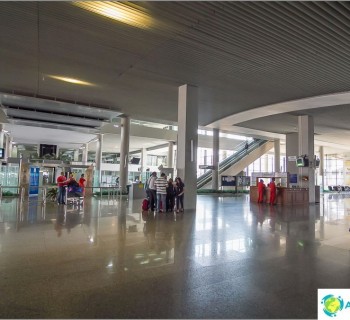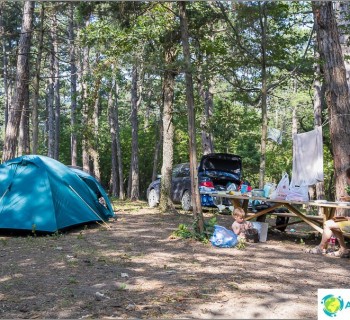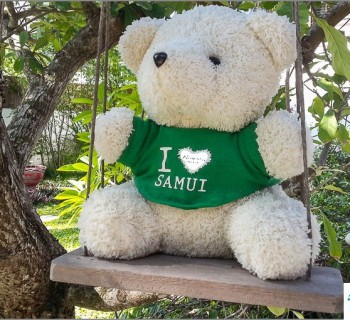I have long wanted to write a similar post, but rather not to share the info, but to find out how other bloggers act in the event of content theft. Option with «Score» not interested, I can do that myself. It's one thing when they take a couple of photos, leaving copyrights, it's okay, I usually allow it when asked (and texts with a backlink, too, if not massively). And another thing is when they merge the text without permission and without giving a link to the source, delete my copyrights on the photo and put down their own. Here you will not pass by, I want to do something.
How can you influence the owners of sites that search content, or search engines, if the owner does not want to resolve anything peacefully? So far, we are considering only official methods, although in principle, if someone knows unofficial ones, you can also tell ...
The content of the article
- one How to deal with theft of content and photos
- 2 How to find stolen content
- 3 How to protect content from theft
How to deal with theft of content and photos
My humble experience
As a rule, I am very reluctant to fight offenders, because I simply have no time, and sometimes it’s a pity to waste time. After all, probably everyone knows that this is quite difficult. Therefore, I am not specifically looking for anything, and readers tell me about the facts of content theft (thanks, guys!). However, when they cheat significantly, then like it or not, it would be necessary to write to the authors of the site and ask them to remove it. Usually at this stage, in 50% of cases, after the correspondence, the issue is resolved. Those who run a site for people, in principle, it is not difficult for them to do this, reputation is more expensive.
But there is another category of people who take advantage of the fact that the legislation in the Russian Federation is crude, copyright protection works only through the courts (and there are few precedents). These are the ones who steal without a twinge of conscience, they say, everything that is posted on the Internet is free for distribution. Here they can, both on trifles, and sites entirely with the help of parsers and grabbers. Therefore, do not ask such people, you will not achieve anything. In principle, it doesn't really matter to me whether someone steal from me or not (if we are talking about sites), but I would not want such copied articles to appear in search engine results and people came to them instead of my articles.
Accordingly, it turns out that the only thing that can be done from the obvious is to write to the author of the resource, write to the hosting, and then try to complain in search engines.
Letter to the author of the resource
First of all, it makes sense to contact the author of the resource where you saw your content (text or photo). I usually look for a contact page with links to social media groups or profiles. And if this is nothing, it means that you can, in principle, not look for ways to contact. Most likely the site was made in a semi-automatic mode and this is not an SDL.
Here is one example of a very recent letter to the authors of one of the blogs that they ripped off a large number of my photos from Koh Samui..
Hello! It is not good to steal photos and content. If you did it by accident, please remove it. If on purpose, then within a few days I will send complaints to all search engines, your hosting, and the registrar. I have the sources of the photos, that is, you can go to court.
- here is a list of links to plagiarism
I suppose that not only in these articles stolen photos, and not only mine. I have already noticed several photos from other bloggers I know, I think the guys will support me in complaints. I will study your site with passion. But I hope we can settle this issue peacefully.
Hosting letter
The second stage - you can write letters to the hosting. You can easily find it out from WHOIS, for example here. By entering the domain, we will see nserver’and for which it is easy to calculate hosting. True, occasionally third-party servers are used, then you can calculate by the IP of the site. You can also try to write to the domain registrar, but they always seem to send. At least I was always denied due to lack of a court order.
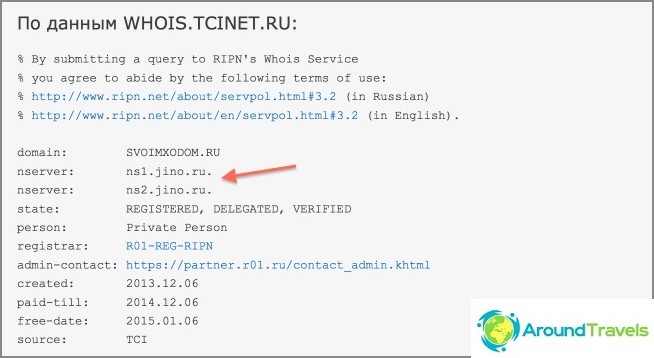
NS servers often show who is hosting the thief site
Hosting can sometimes help. They helped me. Yes, they did not block the account of the negligent owner of the site, but somehow they influenced it, and the pages with copy-paste disappeared from the site. I read that the worst thing, if hosting is in Ukraine, or elsewhere abroad, is that they never make contact at all. Such hosting is also called bulletproof. But any hosting can ask for an official court order, but few will go to court ... And here, as you agree, you can threaten to damage your reputation, for example.
I wrote letters similar to the following (depending on the specific situation).
Hello! You have a registered site XXXX.XX hosting other people's articles and photos without permission. I assume that it mostly consists of stolen content (copypaste).
Below are examples of articles taken from my personal blog. In addition to the text, photographs were taken, some of them show me, my wife and my son. Again, we did not give permission for this. Most of the photo still has a watermark. «life-trip.ru», and they are also downloaded to addresses from my server, which only confirms my authorship, although I also have the source code.
- here is a list of links to originals and plagiarism
On top of that, the rest of the articles are also stolen, I know, the blog owners whose they are. There is also speculation that articles are being stolen using a parser. Please take action to remove pages that infringe on my copyright.
Complaint to Google and Yandex
If the hosting turned out to be bullet-resistant (ignores any complaints), then Google and Yandex remain. Below are the links where you can complain.
https://www.google.com/webmasters/tools/spamreport?pli=1&hl=ru (complaints main page)
https://www.google.com/webmasters/tools/spamreportform?hl=ru (complain about this or that site / article)
https://www.google.com/webmasters/tools/dmca-notice?hl=ru&pid=0 (complaint if there are documents confirming your copyright)
http://webmaster.yandex.ru/delspam.xml
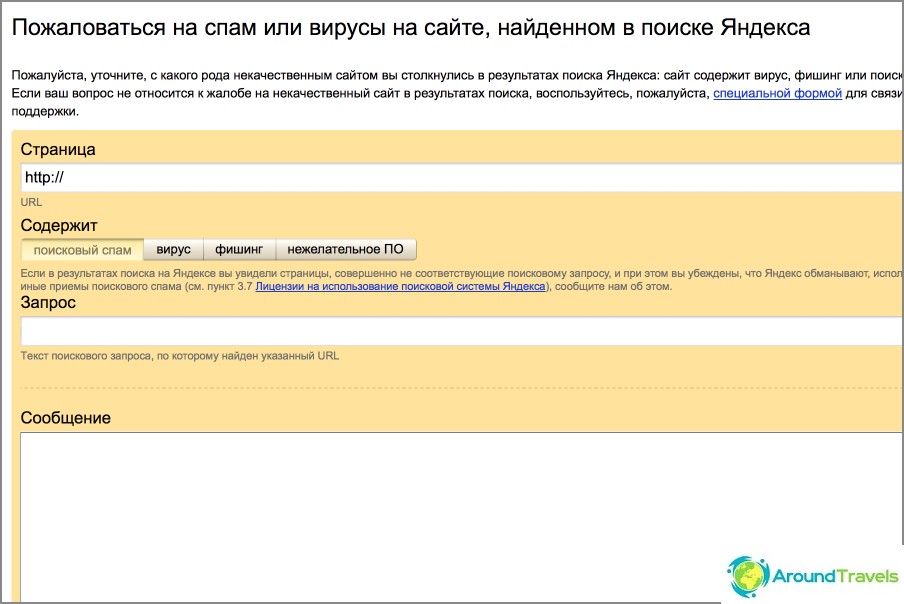
Complain to Yandex
Informal ways
To be honest, I have not studied the topic of black methods at all, since I do not often have to fight (I do not specifically look for stolen content), and somehow it’s not good either. From what immediately comes to mind is to buy some links on completely non-thematic sites (porn sites?) In SAPE and indicate there the violating site of your rights as an acceptor. In theory, search engines should not like this..
Also, for sure, you can order to break the site or send a bot attack to it. True, I don't know how much money it is, maybe it's not worth it from a financial point of view..
Copyright protection in court
There remains the very last and most difficult way - judgment. As a rule, few people decide on this, because they will have to spend both money and time on the process. But if you win, sometimes you can recoup all the costs. True, here we are talking more about the theft of photographs, especially for commercial use, and not about text..
There are already precedents, photographers are suing, which means that some courts are already aware of copyright and it will be much easier to follow the beaten path. First, you will need to deposit the pages of the site with a notary, and then file a lawsuit. Here are the details of this method, link 1, link 2.
It seems to me that when copyright lawsuits become commonplace, the number of theft attempts should decrease. I think that even now large publications have already stopped taking photographs without permission, because it is easier to pay a couple of hundred rubles and buy them on photo stocks or directly from a photographer, especially since many of them will be allowed to use for free while maintaining copyrights.
How to find stolen content
To search for texts, you can use the eTXT program, having previously received a list of links to the pages of your site and uploaded them in Operations / Site Check.
And if you're looking for photos, Google Image Search will help you. You can search on Google itself in the pictures section by uploading a file or providing a link to it.

Click on the camera icon
It's easier and faster to install the Search by Image for Google app for Firefox (I don't know what they are called in other browsers). Then on any site on any picture, you can right-click and the context menu will have the item Search Image on Google.
How to protect content from theft
In my opinion, protecting content is practically unrealistic from a technical point of view. Popular advices on how to place scripts that prohibit copying, to prohibit the right-click operation, are valid only from fools and only cause inconvenience to site users. And those who copy and paste content often easily bypass all the prohibitions. Moreover, this is often done automatically, rather than manually..
Therefore, there is only one way out - to make sure that your pages are indexed as soon as possible. If the blog is old, then it happens rather quickly, if the blog is young, then this is the problem. True, if the blog is young and has not been particularly visible anywhere, then it is unlikely that they will take anything from it, they simply will not learn about it. It is also worth knowing that trust sites with duplicate content are more likely to be ranked higher by search engines than the originals. In fact, originality is not as important to search engines as to us, the authors..
I will list what you can try to do to speed up indexing and content protection:
- Get bogged down with Google+ authorship. I will not go into detail, it draws on a separate post and has already been painted in many places. In short, you need to link to your Google+ profile on every page with a rel = author attribute, and add a link to your blog in the links section of your profile (in My Posts). Do not forget to check the micro-markup later.
- Before publishing, you can add the post text to «Original texts» Yandex. I do not know how much this is taken into account when determining the primary source, but what the hell is not kidding. In order not to waste time, use the plugin Webmaster Yandex. Post is added in one click.
- After publication, you need to place links to your post in all social networks, in your profiles and groups (Vkontakte, Facebook, Twitter). This is where the Nextscripts Social Networks Auto-poster (SNAP) plugin comes in handy. It automatically cross-posts to configured accounts when publishing. All this should speed up indexing..
- You will have to add pens to your Google+ profile, since the ability to cross-post to G + in the SNAP plugin is paid. And you can post to the Google+ group through this service. By the way, placing a link in G +, in addition to speeding up indexing, as far as I understand, also speaks of the original source.
- If your profiles / groups are not promoted, then you can buy publications and tweets in promoted groups and accounts.
- It is important to post regularly so that the robots know that the site is being updated. When I just started, the fast robot came in 2 weeks, now it often comes here. But again, only on the main page, and in new sections he is a rare guest.
- There is a manual way to add to the Google index, almost instantly. You need to go to Google Tools for Webmaster, select «See how GoogleBot», add link and click «Scan». See the screenshot below, it's clearer there.
- There is also a similar way of adding to the Yandex index through Addurilka, only, as far as I have not tried, in my opinion it does not work and does not affect indexing.
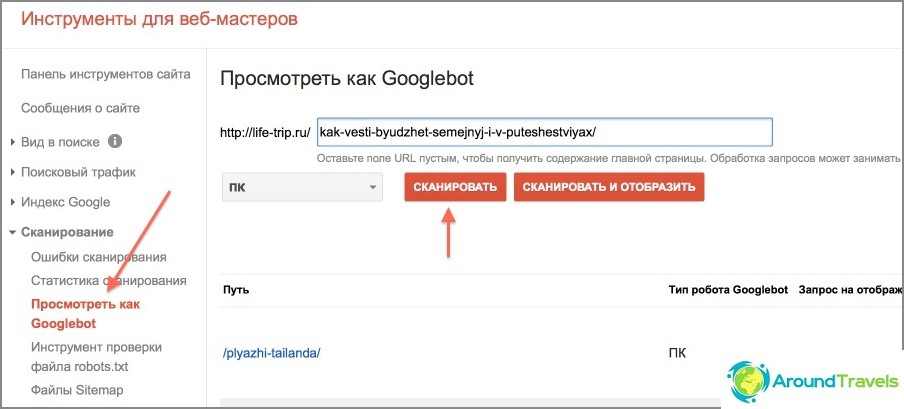
Manual adding to Google index
P.S. The information is quite simple and trivial, but nothing more serious has yet to be applied. I would be glad to add, especially if someone knows how to write a letter to the hoster more competently with links to laws.
